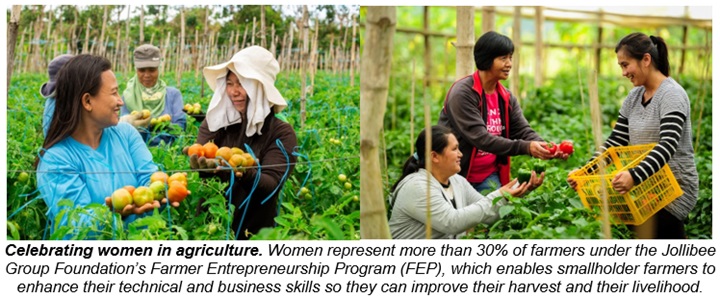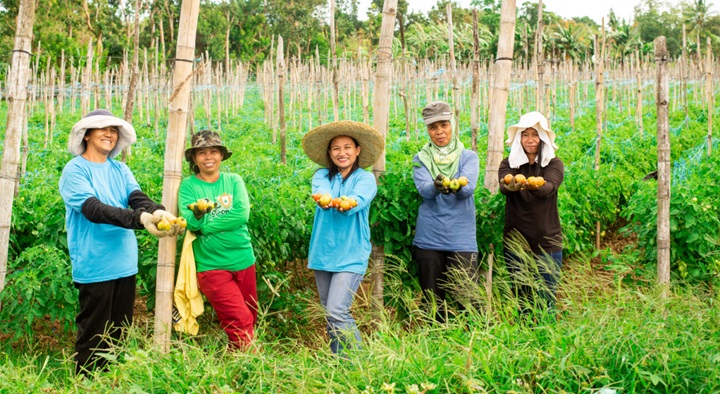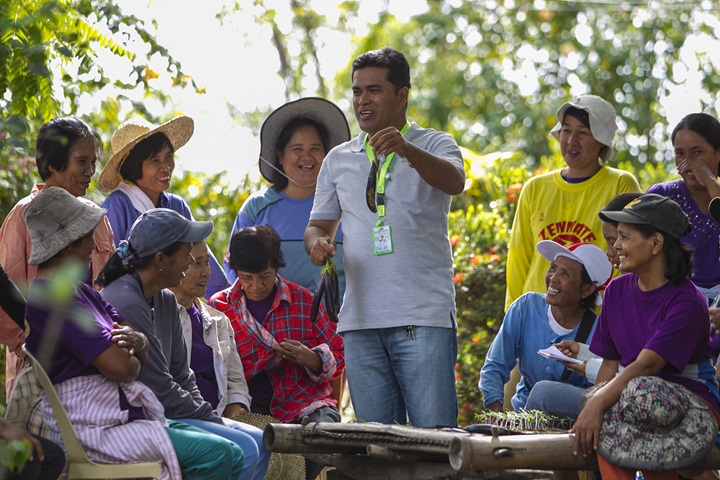
In a sector traditionally associated with men, the significant contributions of women in agriculture often go unrecognized. Official data from the Philippine Statistics Authority from 2007 to 2016 shows that about 25% of workers in the agricultural sector are female, but this data may not fully reflect the actual participation on the ground according to a report by the Philippine Commission on Women (PCW).
On its website, the PCW states that “women’s work in agriculture is normally considered to be extensions of their household tasks and therefore not reported as work.” As such, a large number of women may be unaccounted for in the agricultural sector.
In this piece, the Jollibee Group puts a spotlight on the stories of three women farmers who are proof that women can also thrive and succeed in agriculture work.
Celebrating women farmers
Maricel Sevilleja of San Jose, Nueva Ecija; Noralyn Lopez of Tagudin, Ilocos Sur; and Bernadeth Carandang of Magallanes, Cavite are among the women farmers under the Farmer Entrepreneurship Program (FEP) of the Jollibee Group Foundation (JGF), the social development arm of the Jollibee Group.
The FEP was started in 2008 to help smallholder farmers become entrepreneurs—they learn technical and business skills so they can improve not only their produce, but also their source of livelihood. JGF partners with various organizations to provide the training and interventions, such as helping famers form clusters, so they can collectively meet the volume and quality requirements of buyers like the Jollibee Group.
Sevilleja, now 41 years old and a mother of two, started farming in 2006 when her parents became too old to farm. “Farming is not only for men. We can do what men can,” she said. “Farming may be hard but when you think about it, no work in this world is easy. We only need to learn how to love and enjoy our work.”
“To my fellow women farmers, don’t be afraid to grow and learn more about modern farming. For those who would like to become farmers, welcome! Let’s show the world that women can be great farmers too.”
Like Sevilleja, Noralyn Lopez is also a farmer’s daughter. But farming wasn’t her first choice for work. “Six years akong nagtrabaho as office staff. Tumigil ako last year at nagsimulang tumulong sa tatay ko sa pag-supply ng onion sa Jollibee Group,” she shared. (I worked as an office staff for six years. I stopped working last year to help my father in farming onions to supply to the Jollibee Group.)
Lopez also shared her encouraging experience: “Wala naman ng gender issue. May gender equality naman na po. Ang mga kasama naman namin sa farming, itinuturing naman na akong kapatid.” (There’s a sense of gender equality. My colleagues see me as their sibling.)
Thriving in agriculture work. Bernadeth Carandang (middle in sky blue) and other women farmers proudly show their harvested onions. Aside from being a farmer, Bernadeth is also a teacher and a leader of the Mag-Samakame farmers’ cooperative in Cavite.

Bernadette Carandang shares the same sentiment. “Kaming mag-asawa, parehong magsasaka. Hindi limitasyon ang pagiging babae para sa ganitong larangan,” she said. (My husband and I are both farmers. Being a woman should never be a hindrance for this type of work.)
Before becoming a farmer, Carandang used to work in an electronics company. Today, she’s also a teacher and a farmer leader of Mag-Samakame cooperative in Cavite. She emphasized the need for sustained programs that help farmers improve their livelihood, such as the FEP.
Helping farmers to become entrepreneurs
“Tinuruan ako ng FEP na gawing matatag na negosyo ang pagsasaka,” Carandang shared. “Bukod sa kaalaman sa makabagong pagsasaka dahil sa mga bigay nitong teknikal na kaalaman, ang paghubog sa aking kamalayan na ang pagsasaka ay isang profession ay hindi matatawaran.” (FEP taught me to turn farming into a stable business. Apart from the technical skills in modern farming that I have learned from them, I have also developed the mindset that farming is a profession. This to me is invaluable.)
The white onions, green bell peppers, tomatoes, and other vegetables that the Jollibee Group uses in select products of Jollibee, Chowking, Greenwich, and Mang Inasal come directly from smallholder farmers across the Philippines like Sevilleja, Lopez, and Carandang. In the last five years, FEP farmers have generated a total of P370 Million worth of sales.
“Jollibee Group po ang aming unang institutional buyer. Tumaas po talaga income namin. Ngayon, plano po namin na mas mapalawak pa ang koneksyon namin sa institutional buyers, in coordination with our local government unit,” Carandang said. (The Jollibee Group is our first institutional buyer. Our income definitely increased. We aim to expand our connection with institutional buyers in coordination with our local government unit.)
But one of the greater challenges that must be addressed these days is how the younger generation perceives farming. “Sabi ko nga sa mga estudyante ko, ‘Ano ang gusto niyo maging pag dating ng araw?’ Walang may gusto mag farming. Ngayon, tinuturuan ko sila na ang agriculture ay hindi pang mahirap. Ito ay business. Kung may farmer, may pag-asa,” Carandang said. (I asked my students, ‘What do you want to be when you grow up?’ No one wants to become a farmer. Now I’m teaching them that farming is not a poor man’s job. It is a business. When we have more farmers, we have more hope for the future.)


